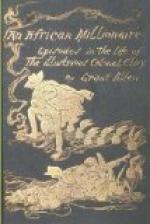But Charles, gallant as ever, replied with a smile, “We have you with us for so short a time, you know!” Which made Mrs. Forbes-Gaskell blush again that delicious blush of hers.
During all this time the Professor went on calmly and persistently mineralogising. “Wonderful character!” Charles said to me. “He works out his parts so well! Could anything exceed the picture he gives one of scientific ardour?” And, indeed, he was at it, morning, noon, and night. “Sooner or later,” Charles observed, “something practical must come of it.”
Twice, meanwhile, little episodes occurred which are well worth notice. One day I was out with the Professor on the Long Mountain, watching him hammer at the rocks, and a little bored by his performance, when, to pass the time, I asked him what a particular small water-worn stone was. He looked at it and smiled. “If there were a little more mica in it,” he said, “it would be the characteristic gneiss of ice-borne boulders, hereabouts. But there isn’t quite enough.” And he gazed at it curiously.
“Indeed,” I answered, “it doesn’t come up to sample, doesn’t it?”
He gave me a meaning look. “Ten per cent,” he murmured in a slow, strange voice; “ten per cent is more usual.”
I trembled violently. Was he bent, then, upon ruining me? “If you betray me—” I cried, and broke off.
“I beg your pardon,” he said. He was all pure innocence.
I reflected on what Charles had said about taking nothing for granted, and held my tongue prudently.
The other incident was this. Charles picked a sprig of white heather on the hill one afternoon, after a picnic lunch, I regret to say, when he had taken perhaps a glass more champagne than was strictly good for him. He was not exactly the worse for it, but he was excited, good-humoured, reckless, and lively. He brought the sprig to Mrs. Forbes-Gaskell, and handed it to her, ogling a little. “Sweets to the sweet,” he murmured, and looked at her meaningly. “White heather to White Heather.” Then he saw what he had done, and checked himself instantly.
Mrs. Forbes-Gaskell coloured up in the usual manner. “I—I don’t quite understand,” she faltered.
Charles scrambled out of it somehow. “White heather for luck,” he said, “and—the man who is privileged to give a piece of it to you is surely lucky.”
She smiled, none too well pleased. I somehow felt she suspected us of suspecting her.
However, as it turned out, nothing came, after all, of the untoward incident.
Next day Charles burst upon me, triumphant. “Well, he has shown his hand!” he cried. “I knew he would. He has come to me to-day with—what do you think?—a fragment of gold, in quartz, from the Long Mountain.”
“No!” I exclaimed.
“Yes,” Charles answered. “He says there’s a vein there with distinct specks of gold in it, which might be worth mining. When a man begins that way you know what he’s driving at! And what’s more, he’s got up the subject beforehand; for he began saying to me there had long been gold in Sutherlandshire—why not therefore in Ross-shire? And then he went at full into the comparative geology of the two regions.”




